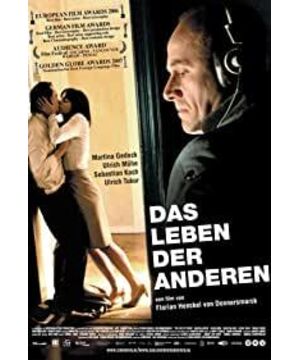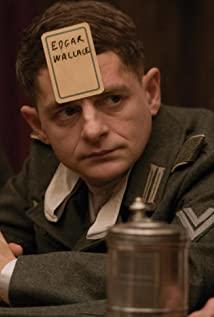What we can do is beyond what you little artists can imagine.
Think about those performance artists who like to shut themselves in glass rooms, or fish tanks, or on toilets, exposing their lives to the audience, and I can't help but want the minister's words to intimidate them, "We can do it. It's not something you little artists can imagine."
Think about the entire population of East Germany, all of which are visitors in a glass room, as Comrade Minister said, "completely, every detail of life, including your married life, everything."
For me, who blindly worshipped 1984, this is a good tribute from the younger generation.
I'm not very satisfied with the first half, and Wiesler's change of mind is too sudden, right? There is absolutely no wave-like advance, the socialist law of spiraling upward. If I were the director, I would have laid out more intriguing details in the first paragraph, but the emptiness and loneliness of life is not enough for him to make such a big sacrifice for a stranger, right? Even if he later stole a playwright's poetry collection, and he was considered a fan, then Yang Lijuan herself would not commit suicide by jumping into the sea! The only foreshadowing the director made is the prostitute part. I have to say that the actor who plays the prostitute is really top-notch, so huge and fat that he can bury his head in the middle of her chest, how soft and warm he imagined- - - - ¥#%%, sorry for digressing again.
I still prefer to understand that this character is too fake-----In the history of East Germany, there is no such person like Wiesler. Without a real prototype, without the details laid out, the whole story becomes very far-fetched.
This far-fetched feeling continues throughout most of the film.
But the last paragraph is still very well done! Occasional dialogues in the theater led to clues. The playwright was looking for clues, especially when I saw Wiesler on the street. At that time, I cried in my heart, don’t be a dog, don’t be a dog, and sure enough, the director heard my voice and didn’t make the playwright very stupid. Blood rushed to the savior, but it took Wiesler 2 years to realize that what he did was not worthless.
The wide-angle lens used a lot in the whole film reaches its extreme at the entrance of the bookstore. The huge words "Karl Marx Bookstore", the wide-angle is almost deformed, the huge sense of space, the cold tone, and then cut into the bookstore, close-up, Wiesler picks up the book , Wiesler paid, and the distance between Wiesler and the salesperson was only a few tenths of a centimeter. I finally felt the power of the camera.
I really like the director's way of handling the last paragraph. It's calm and there are no sloppy shots at all. The simple subtitles directly express the passage of time, and the rich facial expressions are not used to express the inner excitement-----, the superficial amorous feelings. Quiet, the inner waves are rough, and these 15 minutes are enough to make up for all the small mistakes in front of me.
Of course, there is also the stool prop, which was explained at the beginning, throughout the whole play (the sweat of the prisoner is left here, and it will be saved for future tracking by the police dog), which is creepy.
Most people are probably very empathetic to being watched, the insecurities of being spied on, the desire for freedom, and so on. But oddly, I prefer what the Minister of Culture said in the theater "This is the Germany you artists want, right? What else is there to write about? People have no faith, no love". Probably what he said is not wrong. How precious freedom was at the beginning, but without the strictness of imprisonment, how can freedom be precious? In other words, when people thought that breaking the cage would make the world a better place, the world was given another cage.
Really good film, but still feel that the Oscar judges have politically overestimated it, especially when it beat my beloved Pan's Labyrinth for best foreign language film.
The two main characters are really great! It's really great! !
View more about The Lives of Others reviews











